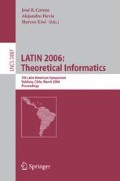Abstract
We present a second order logic of proportional quantifiers, \({\mathcal SOLP}\), which is essentially a first order language extended with quantifiers that act upon second order variables of a given arity r, and count the fraction of elements in a subset of r–tuples of a model that satisfy a formula. Our logic is capable of expressing proportional versions of different problems of complexity up to NP-hard, and fragments within our logic capture complexity classes as NL and P, with auxiliary ordering relation. When restricted to monadic second order variables our logic of proportional quantifiers admits a semantic approximation based on almost linear orders, which is not as weak as other known logics with counting quantifiers, for it does not has the bounded number of degrees property. Moreover, we show in this almost ordered setting the existence of an infinite hierarchy inside our monadic language. We extend our inexpressibility result to an almost ordered (not necessarily monadic) fragment of \({\mathcal SOLP}\), which in the presence of full order captures P. To obtain all our inexpressibility results we developed combinatorial games appropriate for these logics.
Access this chapter
Tax calculation will be finalised at checkout
Purchases are for personal use only
Preview
Unable to display preview. Download preview PDF.
References
Arratia, A., Ortiz, C.: Approximating the Expressive Power of Logics in Finite Models. In: Farach-Colton, M. (ed.) LATIN 2004. LNCS, vol. 2976, pp. 540–556. Springer, Heidelberg (2004)
Ebbinghaus, H.D., Flum, J.: Finite Model Theory. Springer, Heidelberg (1995)
Fagin, R.: Comparing the power of games on graphs. Mathematical Logic Quarterly 43, 431–455 (1997)
Grädel, E.: Capturing complexity classes by fragments of second order logic. Theoretical Comp. Sci. 101, 35–57 (1992)
Immerman, N.: Descriptive Complexity. Springer, Heidelberg (1998)
Libkin, L., Wong, L.: Lower bounds for invariant queries in logics with counting. Theoretical Comp. Sci. 288, 153–180 (2002)
Stewart, I.: Logical description of monotone NP problems. J. Logic Computat. 4(4), 337–357 (1994)
Author information
Authors and Affiliations
Editor information
Editors and Affiliations
Rights and permissions
Copyright information
© 2006 Springer-Verlag Berlin Heidelberg
About this paper
Cite this paper
Arratia, A., Ortiz, C.E. (2006). Counting Proportions of Sets: Expressive Power with Almost Order. In: Correa, J.R., Hevia, A., Kiwi, M. (eds) LATIN 2006: Theoretical Informatics. LATIN 2006. Lecture Notes in Computer Science, vol 3887. Springer, Berlin, Heidelberg. https://doi.org/10.1007/11682462_14
Download citation
DOI: https://doi.org/10.1007/11682462_14
Publisher Name: Springer, Berlin, Heidelberg
Print ISBN: 978-3-540-32755-4
Online ISBN: 978-3-540-32756-1
eBook Packages: Computer ScienceComputer Science (R0)

